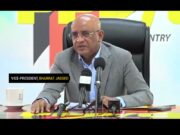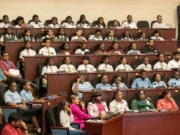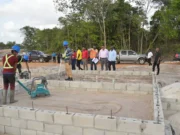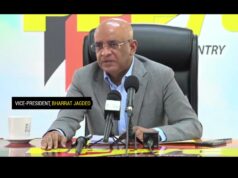The Regional Accelerator for STEM Students Readiness (RASSR) project is making waves by identifying and nurturing children with a ‘genius spark’.
During an episode of the Energy Perspectives Podcast, the Vice Chancellor of the University of Guyana (UG), Professor Paloma Mohamed-Martin, detailed the ambitious goals and impact of the RASSR Project.
The RASSR project, created by UG in collaboration with the Greater Guyana Initiative, was initiated back in 2018, to discover, mentor and develop Science, Technology, Engineering, and Mathematics (STEM) students from across the 10 Regions of Guyana. The project officially started after the COVID-19 period.
“We are looking to see how we can stimulate science students and keep those people who have, this genius spark…to keep students involved in this way and to help them to accelerate,” she said.
The Vice Chancellor explained that the initiative targets high-achieving students who excel in mathematics and science at the National Grade Six Assessment (NGSA).
“We take 10 (students) from each region, and we brought them onto our campus for the last three years, the same students every year,” Professor Mohamed-Martin stated.
The RASSR Project’s curriculum was designed using questions students often fail at the Caribbean Examinations Council (CXC) secondary examination.

“The curriculum was created by our university lecturers, and taught by them in the summer,” she noted. This approach was tailored to build the young students’ skills and prepare them for advanced studies and be admitted into college a year ahead of their peers.
“So the idea was, we wanted them to stay in STEM, we want them to stay in science, because we saw a lot of students do well, and then they fall off, like by 13, they are not in STEM anymore,” the Vice Chancellor said.
She noted that the objective was to retain at least 50% of the original cohort by the fourth year. However, she disclosed that they are now in the third year and the project has only lost one student.
Professor Mohamed-Martin shared that one notable success story from the RASSR project is the recent admission of a 14-year-old student into UG who will be pursuing robotics. “In the first year, when he was 10 years old, nine plus, and came into the camp, we had a robotics workshop with them, and he stayed with that,” she shared.
This early admission reflects the project’s success in accelerating students’ academic progress and sustaining their interest in STEM fields.
Notably, the other students recently took a comprehensive examination based on CXC level questions. “But we have been teaching them against this curriculum, and so now I’m waiting with bated breath on the results of those, because based on that, we will know which ones we could attempt to accelerate next year. They will, either write the CXC in January or May,” Professor Mohamed-Martin said, noting that this could lead to possibly 20-30 young students being admitted to UG.
Moreover, she underscored that the RASSR Project also emphasizes the importance of early science education. The Vice Chancellor advocated for introducing STEM concepts as early as nursery school to build a strong foundation.
Professor Mohamed-Martin explained that in the oil and gas sector, about 20% of the jobs require science to go to commanding heights. She also noted that other sectors like manufacturing and innovation are evolving.
She stated that the RASSR project addresses gaps in the educational pipeline and prepares students for high-demand fields, which will support Guyana’s broader development goals.
As such, she stressed the need to prepare students for these opportunities, by fostering their interest in STEM from a young age. “You need people in science, and you cannot do that in the third form, when you stream them into science. That has to start like, I think in nursery school,” Professor Mohamed-Martin noted.
Additionally, she noted that she is keeping an eye on the recently commissioned St. George’s Science School to see the outcome.













